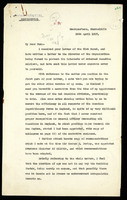World War I: The Final Chapter
When Sam Steele formally resigned from the Mounted Police in 1903, he ended a legendary 30-year career with the Police. After he returned to Canada in 1907 he assumed command of a military district, reconstituted Lord Strathcona’s Horse as a permanent cavalry regiment, and settled down to write his memoirs, which were published in 1915 as Forty Years in Canada: Reminiscences of the Great North-West.
He also found time to serve as president of the Canadian Club and Boy Scout Commissioner.
At the outbreak of war in 1914, he sought an expeditionary command, but the government hesitated because of his age. The public, astonished to see one of its favourite sons ignored, believed Steele was just the man to inspire troops and lift the spirits of the nation. As a result of this pressure, Steele was appointed Major-General in command of the Second Canadian Division, and embarked for England with 25,000 troops. Deemed too old for an active combat command in France, Steele, at the request of General Sir Herbert Kitchener (1850–1916), was appointed overall commander of the Southwestern District in England, including the Canadian training base at Shorncliffe, for which his administrative skills were so very well suited.
Appointed Knight Commander of the Order of St Michael and St George on 1 January 1918, Steele relinquished his command two months later, and officially retired from military duty in July 1918. He succumbed to influenza at Putney, England, on 30 January 1919, and was buried in Winnipeg.
-

-
2008.1.1.1.2.286.1 Letter to C.A. Harwood from SBS
Sir Samuel Steele Fonds > Series 1 Personal Papers > 1.1 Correspondence > 1.1.2 General - Notebooks, Address Books, Letter Registers and Correspondence > General Correspondence - 1917
- Author: Harwood, C.A.; Steele, Samuel B. (Samuel Benfield), 1848-1919
- Recipient: Harwood, C.A.; Steele, Samuel B. (Samuel Benfield), 1848-1919; Harwood, C.A.
- Date: 26 Apr. 1917
- Images: 3
- Description: Letter from SBS written to his brother-in-law C.A. Harwood (Gus), discussing his perceived unfair treatment by the Canadian Military.
-
2008.1.1.1.2.286.1 Letter to C.A. Harwood from SBS
-

-
2008.1.1.1.3.8.44 Ketchen to SBS: 07 Apr 1917
Sir Samuel Steele Fonds > Series 1 Personal Papers > 1.1 Correspondence > 1.1.3 Individuals/Subject-specific > Correspondence - Individuals: H.D.B. Ketchen, [1912], 1915-1918
- Author: Ketchen, H.D.B.; Steele, Samuel B. (Samuel Benfield), 1848-1919
- Recipient: Steele, Samuel B. (Samuel Benfield), 1848-1919; Steele, Samuel B. (Samuel Benfield), 1848-1919
- Date: 07 Apr 1917
- Images: 5
- Description: Letter with envelope to SBS from H.D.B. Ketchen in France.
-
2008.1.1.1.3.8.44 Ketchen to SBS: 07 Apr 1917
-

-
2008.1.1.2.73 Pocket Diary, Personal - June 1917
Sir Samuel Steele Fonds > Series 1 Personal Papers > 1.2 Diaries, Personal
- Author: Steele, Samuel B. (Samuel Benfield), 1848-1919
- Date: Jun. 1917
- Images: 160
- Description: Black leather-bound; pocketbook style; hand-written entries (not all SBS's handwriting?) H.S. note at front of diary: "Very important - Sam Steele's ...
-
2008.1.1.2.73 Pocket Diary, Personal - June 1917
-

-
2008.1.3.3.1.1.97 Military Correspondence - Incoming
Sir Samuel Steele Fonds > Series 3 Professional Papers: Military Career > 3.3 Command in Canada/Second Canadian Division > 3.3.1 Correspondence > 3.3.1.1 Military Correspondence
- Author: Milner, Alfred Milner, Viscount, 1854-1925; Steele, Samuel B. (Samuel Benfield), 1848-1919
- Recipient: Steele, Samuel B. (Samuel Benfield), 1848-1919
- Date: Dec. 1914
- Images: 14
- Description: Correspondence sent to SBS from Lord Milner and separated by Harwood Steele as correspondence to be consulted “only if necessary”. The two letters ...
-
2008.1.3.3.1.1.97 Military Correspondence - Incoming
-

-
2008.1.3.3.3.7 2nd Canadian Division - Inspection Reports - 1916
Sir Samuel Steele Fonds > Series 3 Professional Papers: Military Career > 3.3 Command in Canada/Second Canadian Division > 3.3.3 Reports
- Author: Steele, Samuel B. (Samuel Benfield), 1848-1919
- Date: 19 Apr. 1916
- Images: 3
- Description: Inspection report for inspection conducted April 18th, 1916 of the 33rd Reserve Batallion from London, Ontario. Report completed by SBS, who was ...
-
2008.1.3.3.3.7 2nd Canadian Division - Inspection Reports - 1916
-

-
2008.1.3.3.4.3 Standing Orders - 2nd Canadian Division
Sir Samuel Steele Fonds > Series 3 Professional Papers: Military Career > 3.3 Command in Canada/Second Canadian Division > 3.3.4 Orders, Regulations and Printed Matter
- Author: Steele, Harwood; Steele, Samuel B. (Samuel Benfield), 1848-1919
- Recipient: Steele, Harwood
- Date: 1915
- Images: 24
- Description: Printed booklet of Standing Orders by General Officer Commanding 2nd Canadian Division.
-
2008.1.3.3.4.3 Standing Orders - 2nd Canadian Division
-

-
2008.1.3.3.6.1.1 Portrait of Samuel Benfield Steele, 1918
Sir Samuel Steele Fonds > Series 3 Professional Papers: Military Career > 3.3 Command in Canada/Second Canadian Division > 3.3.6 Photographs > 3.3.6.1 Portraits of Samuel Benfield Steele in Uniform
- Author: Swaine Studios. London.
- Date: 1918
- Images: 2
-
2008.1.3.3.6.1.1 Portrait of Samuel Benfield Steele, 1918
-

-
2008.1.3.3.6.3.1.11 Troop Inspection at Shorncliffe Camp
Sir Samuel Steele Fonds > Series 3 Professional Papers: Military Career > 3.3 Command in Canada/Second Canadian Division > 3.3.6 Photographs > 3.3.6.3 Album Photographs > Album 1: 1st Canadian Command Depot. Shorncliffe
- Author: Lambert Weston Ltd..; Steele, Samuel B. (Samuel Benfield), 1848-1919
- Recipient: Steele, Samuel B. (Samuel Benfield), 1848-1919; Steele, Samuel B. (Samuel Benfield), 1848-1919
- Date: [ca. 1916]
- Images: 1
-
2008.1.3.3.6.3.1.11 Troop Inspection at Shorncliffe Camp
-

-
2008.3.1.1.1.167 Letter to Flora Steele from SBS, 23 Jun. 1915
Flora Steele Fonds > Series I. Personal Papers > 1.1 Correspondence > 1.1.1. Correspondence from Father
- Author: Steele, Flora; Steele, Samuel B. (Samuel Benfield), 1848-1919
- Recipient: Steele, Flora
- Date: 23 Jun. 1915
- Images: 7
- Description: Hand-written letter in which SBS discusses what will happen if he is not allowed to serve with the Canadian Forces in France.
-
2008.3.1.1.1.167 Letter to Flora Steele from SBS, 23 Jun. 1915